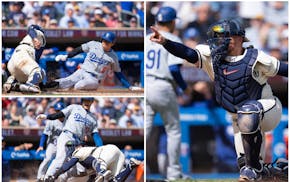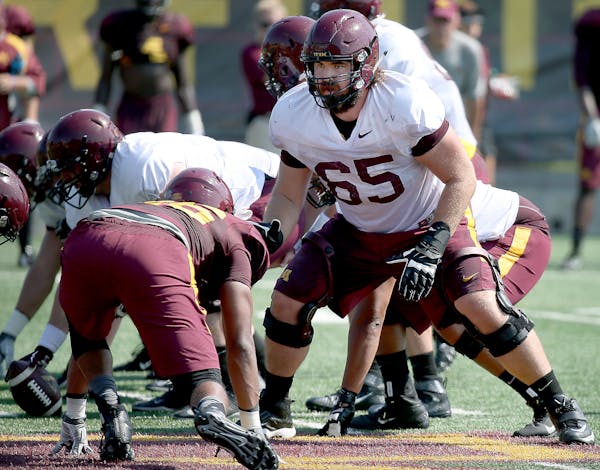The college football season is nearly upon us, so we should clear up a misconception that's gained traction in recent years.
Defense has not been banned from the sport.
It's just hard to find.
Offenses rule college football like a monarchy. The proliferation of turbocharged Xbox schemes has turned games more one-sided than a cheetah racing a hippo.
Offenses are insane right now. More than half of FBS teams — 66 to be exact — averaged at least 400 yards of offense last season. That's not a trend; that's a revolution.
Fifty-nine teams averaged 30 or more points in 2014. By comparison, only two NFL teams reached that scoring average last season.
The Gophers converted 40.1 percent of their third-down opportunities. Not bad, right? That put them 68th nationally in efficiency.
Even TCU's defensive savant, Gary Patterson, loosened his coaching collar last season and watched his offense rip off 46.5 points per game.
What once was considered impressive has become remarkably routine, which begs a question: Why would anyone want to play defense in college football?
"Because there's still a place for the tough guys," Tracy Claeys said with more than a hint of defiance.
Claeys is a little biased. He's the Gophers defensive coordinator and a guy who understandably hates shootouts, even in victory.
Claeys has accomplished the unthinkable at Minnesota: He's made defense a formidable and respected unit.
And he'd rather chew aluminum foil than take a back seat to college football's favorite son.
"When the day comes that I've got to celebrate us winning every game 45-42, this guy will be out of it," Claeys said. "I don't believe in that. I wouldn't sleep at night if I'd give up 42 points every week and be happy about winning. I still think you can play good defense."
It's a tough racket, no doubt. Rules generally favor offense. No-huddle has become the norm. Offenses play at Autobahn speeds. Fans and TV execs love high-scoring games.
College football has been described as basketball on grass, but that's not completely accurate. Some football teams probably could outscore their basketball counterparts.
"It's a challenge," Gophers cornerback Eric Murray said. "It's way harder than playing offense. And it's way more fun."
Murray clearly loves a challenge. He played wide receiver in high school but accepted a move to defense after joining the Gophers. He didn't go kicking and screaming, either.
"I wasn't mad about that at all," Murray said, smiling. "It was a very good decision for me."
That's true. He'll become a high NFL draft pick next spring.
Defensive tackle Scott Ekpe gave offensive tackle a shot as a senior in high school. He felt like a lost tourist in Times Square.
"That didn't turn out so well," he said. "I can't block to save my life. I'm fine with where I'm at."
Playing defense requires determination, a short memory, a dose of nastiness and some strong lungs.
The fad of hurry-up offense gives defenders little time to catch their breath before the next play is coming down their throats.
Baylor averaged 87.5 offensive plays per game last season, which would make sense if games lasted 120 minutes and not half that.
Offenses operate as if they are loaded up on energy drinks and stuck on fast forward. Play, snap, play, snap, play, snap, touchdown. They should come with a warning: Watching this offense may lead to hyperventilation.
A few defensive-minded coaches, including Alabama's Nick Saban, were cast as whiners after complaining that breakneck offense creates safety concerns. Claeys believes their argument was misconstrued.
"They're not talking about injuries in one game because of the no-huddle," Claeys said. "They're talking about the fact that you are taking 300 more snaps in a season, which amounts to three or four more games."
Defensive players simply don't receive the same kind of love as offensive stars. Take the Heisman Trophy, for example. A person might walk on Mars before another defensive player wins that coveted award.
Claeys says playing defense isn't about glory.
"There's kids that want to carry the ball and look good, and then there's guys who want to take the damn thing away," he said. "As long as there's that, we'll be all right."
Chip Scoggins • chip.scoggins@startribune.com

Scoggins: Worried about costly trade to draft a quarterback? Don't be.
Scoggins: 'Wait one more year' can't be the Wild's plan. Thankfully, it isn't.

Scoggins: Finch feeling heat of the Suns as playoff battle looms
Scoggins: Why 'championship or bust' fits these Wolves


